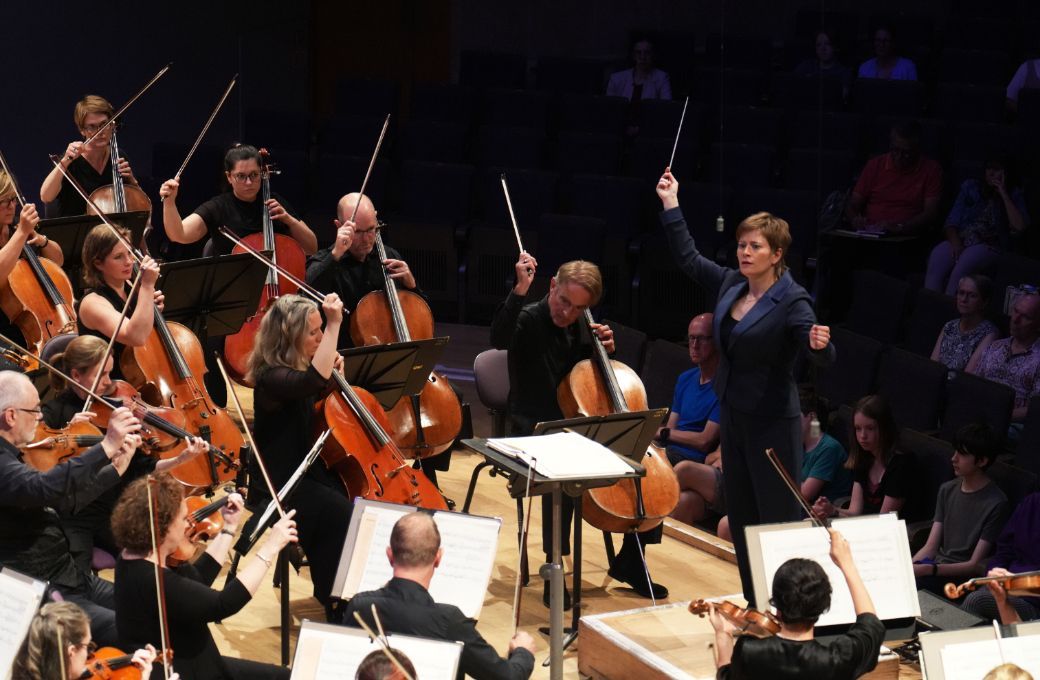This weekend saw the inaugural mcr:classical festival take place at the city’s Bridgewater Hall. Billed as a “breathtaking weekend of music, food, crafts and free foyer entertainment”, the two-day festival represents an exciting collaboration between the city’s musical organisations. With well-conceived concert programmes lasting just 30-60 minutes and weekend or day passes available, further entertainment was provided by student or community groups performing in smaller foyer and corporate spaces around the hall. I was sorry to miss Saturday, not least for a chance to hear Kahchun Wong, Hallé Principal Conductor Designate, in action, but based on Sunday’s evidence, this is a hugely exciting festival promising much for the future if a few small details can click into place.
Sunday opened with the Royal Northern College of Music’s M15 brass quintet performing a handful of competition pieces in front of the hall in a sunny Barbirolli Square. The first ‘main stage’ event of the day followed directly, with Joshua Weilerstein leading the BBC Philharmonic through a programme themed “Identity and Place”. After BBC Radio 3’s Tom McKinney awkwardly invited the slender audience to contrive some thunderous applause for the benefit of radio listeners, Beethoven’s Egmont overture was a punchy, often raucous start to the day, leaving Weilerstein breathless for his immediate on-stage debrief interview.
Elgar’s lyrical Chanson de Matin allowed everyone to calm down, followed by a whirlwind of percussion (seven of them!) for Ravel’s Alborada del gracioso, also featuring some exceptional bassoon solos. Helen Wilson’s remarkable pianissimo control on the alto flute combined superbly with Clifford Lantaff’s harp for the GreenPeace-inspired Towards the Sea II by Tōru Takemitsu, before the striding rhythms of Bartók’s Romanian Folk Dances featured more virtuosic woodwind playing. After a touching tribute to the BBC Philharmonic from Weilerstein, the opening movement of William Dawson’s Negro Folk Symphony took things to a bluesy, thigh-slapping close.
Giving the BBC Philharmonic a chance to find a strong coffee, the day’s most unexpected surprise manifested itself in the form of the Hallé Youth Training Choir, who rattled through an utterly joyous recital in the Barbirolli Room. Using all three dimensions of the space, they sang with consummate confidence and a huge sense of fun, culminating in high-fives all round at the end of the show.

The Philharmonic’s second outing continued with similarly swaggering energy, chiefly from some thrilling woodwind playing. After the shimmering light and crystalline textures of Lili Boulanger’s D’un matin de printemps, Anja Bihlmaier led a big-band style romp through Bernstein’s Dance Episodes from On the Town. The finale, propelled by clarinet fireworks from Oliver Janes (on loan from the CBSO), was as rowdy as could be hoped for. Coleridge-Taylor’s Ballade of 1898 was a surprising though welcome gem, a sumptuous rhapsody of heady romanticism and more rollicking woodwind antics. Kodaly’s Dances of Galánta finished proceedings with another flourish of furioso woodwind virtuosity.
While the city’s symphony orchestras swapped places on the hall’s main stage, the RNCM Bassically Quartet – a tetrad of Brazilian double bassists – entertained a crowded stalls foyer. The finale of the weekend saw Delyana Lazarova lead a reinforced Hallé through Thomas Adès’ Dawn – Chacony for orchestra at any distance and Stravinsky’s Rite of Spring. Adès wrote Dawn for the 2020 BBC Proms with the explicit aim of it being performable by an orchestra of flexible proportions and seating arrangements during the height of the pandemic. Here, in what must be its largest-scale outing to date with a Rite-sized orchestra available, the effect of the progressively broadening orchestration was greatly magnified. Finally, Lazarova led a spirited performance of Stravinsky’s Rite with utmost assurance and confidence on the rostrum. A bassoon solo of strikingly pure sound gave way to vicious trombone snarls, while elsewhere brass semiquavers bounced across the stage from horns to trumpets with immaculate ensemble.
The Stravinsky made for a well-judged and suitably floor-shaking end to a superb day and by all accounts successful weekend. One hopes the festival will be repeated next year; its greatest triumph was the shrewd selection of stimulating programmes, pitting the familiar against the obscure in short, readily-digested concerts. With four female conductors lining up alongside three men for ‘main stage’ events and large numbers of young children in the audiences, it is clearly a festival with an eye on the future.
There were, of course, teething issues. Ticket sales were clearly below expectation, despite an army of staff wearing mcr:classical branded tee-shirts attempting to lure passers-by in from the street. Seating for several orchestral concerts was limited to unreserved stalls seats only, though this memo clearly hadn’t reached all the stewards. No concert programmes were produced beyond a glossy leaflet covering the whole weekend, and even with the fringe events from youth and community groups filling gaps between major performances, there were often long hiatuses in the schedule. The promised array of food vendors amounted to a hog roast and noodle van outside the hall. Overall, though, one hopes this format is here to stay and will continue to grow.


